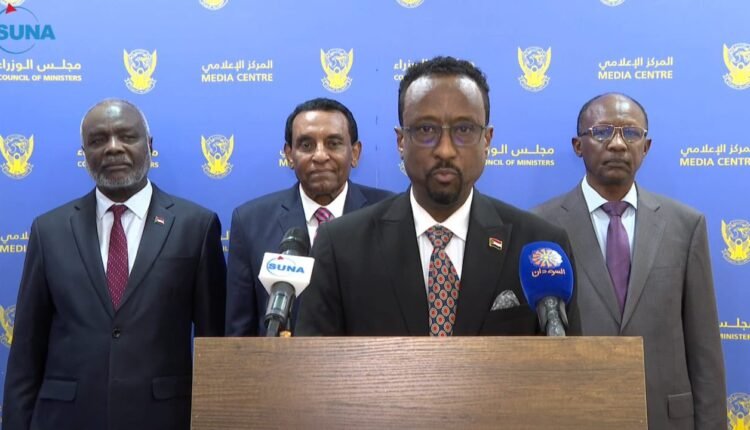Cabinet’s Economic Measures… Old Wine in New Vessels

Sudanhorizon – Nazik Shammam
On Sudan’s economic stage, the same scenes and scenarios have been repeating for decades—similar events and identical decisions. Nothing new seems to emerge. The Sudanese pound continues to fall against foreign currencies without warning, losing its battle to maintain value. The government responds with decisions that often appear repetitive and fail to achieve their intended goal of strengthening the pound. The reason is clear: high demand and low supply—a reality that has persisted since 2011, when Sudan lost more than 80% of its foreign exchange revenues following secession and the loss of oil income. Since then, the situation has remained unchanged until the outbreak of war in 2023, which caused the pound to lose around 600% of its value.
In recent days, the parallel currency markets have witnessed a sharp decline in the value of the Sudanese pound. The exchange rate for one U.S. dollar reached about 3,400 pounds, while the Saudi riyal traded at 906 pounds, the Emirati dirham at 926 pounds, the Egyptian pound at 70 pounds, and the euro at 3,953 pounds.
New Decisions
Last night, the Economic Emergency Committee—chaired by Prime Minister Dr. Kamal Idris—adopted a package of policy measures aimed at stabilizing the economy and reinforcing the exchange rate of the national currency. Key measures included forming an Economic Emergency Committee under the Prime Minister, banning imports unless all banking and commercial regulations are fulfilled, prohibiting the entry of goods that fail to meet approved standards, empowering anti-smuggling forces with resources and legal authority, and enforcing anti-smuggling legislation such that possession or storage of gold without official documents is considered smuggling regardless of location. The measures also require strict monitoring of gold production until export to prevent illegal channels, centralizing the purchase and marketing of gold under a single government body tasked with providing foreign currency for importers.
The Cabinet also called for reviewing the regulations on automobile imports, curbing unregulated imports through informal channels at ports and border crossings, halting illegal levies inconsistent with federal governance law, reviewing export policies, and removing barriers to boost exports and ensure their flow.
Tried Decisions
Former head of the Gold Exporters’ Chamber, Abdel Monem Al-Sadiq, described the Cabinet’s decisions as “catastrophic,” saying they will “destroy what remains of Sudan’s fragile economy.” Speaking to Sudanhorizon, Al-Sadiq stressed that these measures have been tested before with predictable results, denouncing them as “repeating the failed.”
Regarding gold export restrictions, he warned the measures would grant monopoly control over gold exports to select groups, opening the door to corruption. He added that ordinary Sudanese will bear the burden through deeper poverty and hardship. Al-Sadiq further emphasized that past experience proves these measures are ineffective, leading only to resource loss through smuggling and greater corruption.
Absence of Stakeholders
Gold Exporters’ Chamber spokesperson, Atef Ahmed Abdel Qader, criticized the decisions for excluding business leaders and the Employers’ Union, who play a crucial role in combating smuggling. He noted that measures introduced without input from experts and practitioners are futile, stressing the importance of consulting exporters and importers before adopting such decisions. He warned that monopolizing gold exports through a government body will only increase smuggling, given Sudan’s six porous borders. He argued that smuggling thrives on alternatives, and any decisions excluding stakeholders are doomed to fail, describing the Cabinet’s measures as ill-studied. He further noted the irony that the decisions on gold exceeded its actual production.
Recycled Solutions
Economic affairs journalist, Abdel Wahab Juma’a, argued that the Cabinet’s measures to control the pound’s devaluation include both administrative-security actions and policy-related ones. He stressed that purely administrative-security measures cannot solve the problem, noting they have been tested repeatedly in the past with no success.
Juma’a explained that the decision to centralize gold marketing under a single government body is impractical, as most gold is produced by artisanal miners and individuals, beyond the government’s control. He emphasized the near impossibility of imposing full state control over such decentralized production.
Speaking to Sudanhorizon, Juma’a acknowledged that anti-smuggling legislation is a positive step if enforceable. However, he doubted its effectiveness, given Sudan’s vast geography, which makes enforcement difficult. He argued the government should instead adopt supportive policies.
He noted there are some positives in the Cabinet’s decisions—particularly those related to exports and imports—that could encourage exporters and importers to fight smuggling if their demands are met. Reviewing illegal levies, he said, is also a positive move that could strengthen trust between the government and private sector.
Juma’a stressed the need for coordination between the Ministry of Finance and the Central Bank on monetary and fiscal policies, warning that without such coordination, the measures will not succeed in raising the value of the Sudanese pound. He concluded that these are simply recycled measures, no different from those of the past, which failed to deliver real progress.
Shortlink: https://sudanhorizon.com/?p=7134

